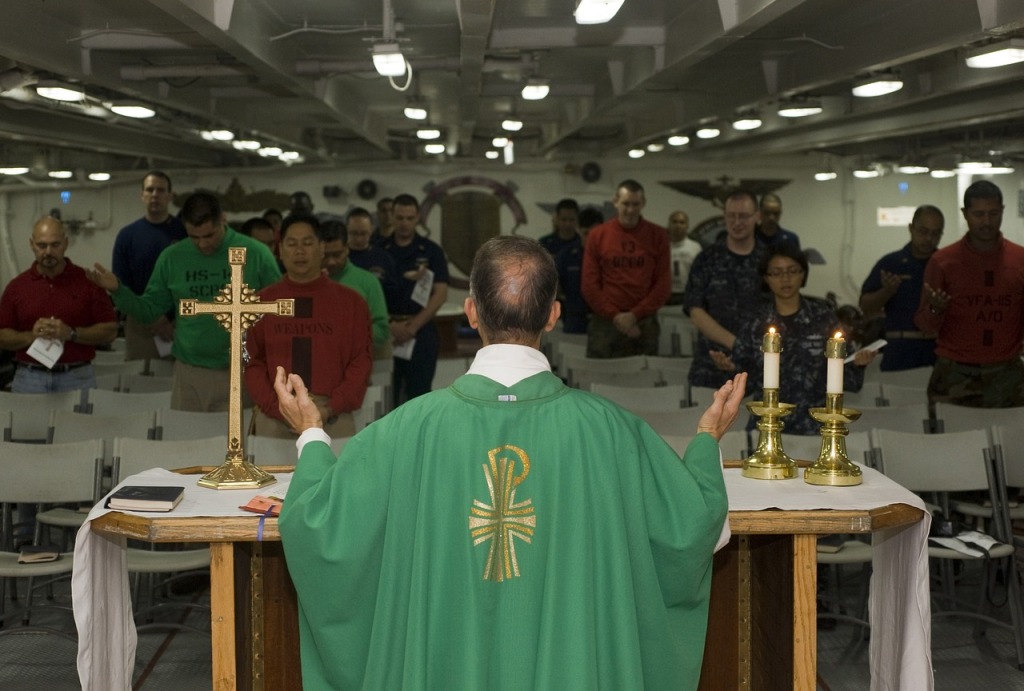Image courtesy of Pixabay
This post is not one of the seminary reflections but took place here chronologically.
The school year proceeded about the same as the first one had. Advent arrived with preparation for Christmas. In the last week before Christmas, I was summoned for a phone call, not usually a good sign. My mother was on the phone and told me that my grandfather, her father, had died suddenly that morning. He had a heart condition and was taking nitroglycerine tablets. He decided to go out to shovel some snow and had a heart attack. He was not able to get back inside for his pills and had died suddenly on the way into the house.
My parents were about to leave for Dunkirk and had arranged to pick me up after supper to go to the funeral home. I was stunned. All four of my grandparents had been alive up to then and I had never experienced the death of a close relative.
I had lived with him and my grandmother and mother while my father was away in World War II. I had little recollection of those early days except for the trains. We would hear a train whistle in the distance, and from its direction could tell if it was the New York Central, running along Lake Erie or The Nickel Plate which stopped at the end of Park Avenue, about half a block from my grandparents’ house. My grandfather and I would bundle into the car, rush down to the tracks and watch freight trains pass or passenger trains stop briefly to load or unload passengers or packages. I especially liked to watch the train start up again. A billow of smoke rose from the smoke stack and the train let out a single chug while the wheels moved only slightly. After several of these starts, the train began its forward movement and was underway. We would also go to the other end of Park Avenue to the dock to watch the fishing boats come and go.
When I was older and we had moved to Rochester, I would sometimes stay with my grandparents for a week during the summer. I would go with my grandfather to his drug store, watch him sort pills and go down to the cellar with him for supplies. I would also help sweep the floors and dust candy cases. I wished he had a soda fountain like some drug stores did at the time. His candy counter had jars of various penny candy. The simplest, but in my eyes, the most exotic, was a jar of rock candy. I knew it was just sugar and water, but somehow it fascinated me. When it was time to close up the store for the day, he would always ask me if I wanted to pick out some candy before we left, and I always picked out the rock candy, a band of clear crystal sugar on a string.
I recalled these memories on the way to the funeral home. He had been retired for about five years and had enjoyed every day of his retirement as he had his earlier life. It was hard to find a parking place. He was loved by everyone and it seemed everyone had come to say good bye.
Inside were my uncles, aunts, cousins and people I had seen coming and going at my grandparents’ house. Some I knew and some I did not. Near the casket sat my grandmother, uncharacteristically quiet and sad. She was usually the one making sure everyone had what they needed. This time everyone was hovering over her in case there was something she needed.
When I finally reached her, we stood and hugged each other for quite a while, sharing our tears for my lost grandfather and her lost husband. Despite all the people there, it was as if we were alone in her kitchen for a few moments with no one around.
My tears continued as I approached to kneel before his casket surrounded by what seemed like endless flowers. He looked like himself although a little powdery. I had never seen him that still. He was always telling a story or laughing at someone else’s story. Even when asleep in his chair he always snored to let us know he was still with us in his own way.
Later in the evening at my grandmother’s house, everyone told stories about my grandfather and his observations about life. He did not have the literary gifts of Samuel Clemens, or at least never showed them if he did. However he did have a quick wit and knack for comical observation of human foibles which kept us all entertained.
Someone wondered whether my grandfather had ever become angry in his life. Everyone stopped to think but had trouble coming up with anything. My Aunt Helen did recall once when he had told my uncles Dick and Charlie to stop running through the house. When they kept it up, he got out of his chair to chase them, but then broke into his usual laughter, realizing he could not catch them anyway. That seems to have been the closest he ever came to being angry.
Despite his placid nature, he must have been quite determined. He was born one of eight children to immigrant Irish parents who originally came to the coal fields in Wilkes-Barre, Pennsylvania. They made their way to Belfast, New York, building a farm house on top of a rocky hill where it was difficult to walk. I could not imagine how they ever broke the soil to grow anything. I think they had mostly cows.
My grandfather somehow made his way to the University of Buffalo Pharmacy School from which he graduated. He worked in a drug store in Niagara Falls where he met my grandmother and eventually bought a drug store in Dunkirk. He provided well for my grandmother and their six children. I think the best thing he left them was his sense of humor and ability to manage whatever came his way in life without the smallest complaint.
I was grateful that I had a chance to be with him, especially on the afternoons in his drug store. I never really knew what he thought. I don’t know whether he worried about his health or about his family, what he thought about current events or whether there was anyone in the world he did not like. He never spoke ill of anyone. He did see foibles, his own as well as everyone else’s, and had a way of seeing their comical side, his included, without ever being critical of anyone.
I went to the funeral the next day, Christmas Eve. My Uncle Dick, my grandfather’s second son said the funeral mass solemnly and with more emotional control that I could imagine, especially knowing we were saying good-bye to a family treasure. I served as an altar boy with my brother and had to fight back tears several times during the Mass. At the cemetery, my uncle repeated the words from the last hymn at church, “In Paradisum, Deducant Te Angeli”- May the Angels lead you into Paradise. I no longer had control of my tears.
We had dinner at Rusch’s Restaurant, owned by my father’s cousins, and returned to my grandparents’ house where Christmas Eve had lost its charm for me. I did have my traditional beer with my grandmother in the kitchen. Neither of us could think of anything to say. After we were done, we hugged and shared our tears for our mutual loss. Later we opened our presents as usual in the front parlor, but no one sat in my grandfather’s chair. I glanced at it from time to time, always saddened by its emptiness.
I returned to the seminary for collation although I supposed I did not have to. I could have stayed to eat with my relatives the many foods left by neighbors and friends. Since it was Advent and the eve of a feast day, it was not yet time to celebrate Christmas. This collation consisted of hard boiled eggs, baked beans, string beans, bread and butter with milk to drink and fruit cocktail for dessert. I decided I had made the wrong choice and should have stayed with my relatives for dinner. Before eating, Father Brendan asked everyone to keep my grandfather, me and our family in their prayers. My tears returned and I decided I was not very hungry anyway.
The midnight Christmas Mass was again quite a production. Afterwards, I went back to my grandmother’s where she was cooking bacon and eggs as if nothing had happened, although I knew that inside, things were not the same for her and never would be.
The next night I was back at the seminary, and most of the week managed to get lost in the Christmas week festivities and seemingly endless games of euchre and hearts. Classes were soon back in full swing and I was back to reading for class when I had to and reading war novels when I had the chance.
From my book, Young Man of the Cloth, available in paperback or digital format from Amazon










You must be logged in to post a comment.